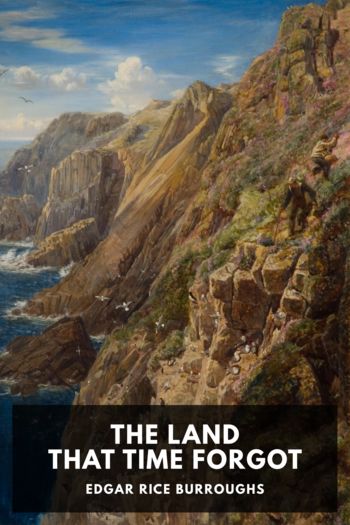South!, Ernest Shackleton [good books to read in english TXT] 📗

- Author: Ernest Shackleton
Book online «South!, Ernest Shackleton [good books to read in english TXT] 📗». Author Ernest Shackleton
Our thoughts now turned to the Danger Islands, thirty-five miles away.
“It seems that we are likely to drift up and down this coast from southwest to northeast and back again for some time yet before we finally clear the point of Joinville Island; until we do we cannot hope for much opening up, as the ice must be very congested against the southeast coast of the island, otherwise our failure to respond to the recent southeasterly gale cannot be well accounted for. In support of this there has been some very heavy pressure on the northeast side, of our floe, one immense block being upended to a height of 25 ft. We saw a Dominican gull fly over today, the first we have seen since leaving South Georgia; it is another sign of our proximity to land. We cut steps in this 25 ft. slab, and it makes a fine lookout. When the weather clears we confidently expect to see land.”
A heavy blizzard obscured our view till March 23. “ ‘Land in sight’ was reported this morning. We were sceptical, but this afternoon it showed up unmistakably to the west, and there can be no further doubt about it. It is Joinville Island, and its serrated mountain ranges, all snow-clad, are just visible on the horizon. This barren, inhospitable-looking land would be a haven of refuge to us if we could but reach it. It would be ridiculous to make the attempt though, with the ice all broken up as it is. It is too loose and broken to march over, yet not open enough to be able to launch the boats.” For the next two or three days we saw ourselves slowly drifting past the land, longing to reach it yet prevented from doing so by the ice between, and towards the end of March we saw Mount Haddington fade away into the distance.
Our hopes were now centred on Elephant Island or Clarence Island, which lay 100 miles almost due north of us.
If we failed to reach either of them we might try for South Georgia, but our chances of reaching it would be very small.
VIII Escape from the IceOn April 7 at daylight the long-desired peak of Clarence Island came into view, bearing nearly north from our camp. At first it had the appearance of a huge berg, but with the growing light we could see plainly the black lines of scree and the high, precipitous cliffs of the island, which were miraged up to some extent. The dark rocks in the white snow were a pleasant sight. So long had our eyes looked on icebergs that apparently grew or dwindled according to the angles at which the shadows were cast by the sun; so often had we discovered rocky islands and brought in sight the peaks of Joinville Land, only to find them, after some change of wind or temperature, floating away as nebulous cloud or ordinary berg; that not until Worsley, Wild, and Hurley had unanimously confirmed my observation was I satisfied that I was really looking at Clarence Island. The land was still more than sixty miles away, but it had to our eyes something of the appearance of home, since we expected to find there our first solid footing after all the long months of drifting on the unstable ice. We had adjusted ourselves to the life on the floe, but our hopes had been fixed all the time on some possible landing-place. As one hope failed to materialize, our anticipations fed themselves on another. Our drifting home had no rudder to guide it, no sail to give it speed. We were dependent upon the caprice of wind and current; we went whither those irresponsible forces listed. The longing to feel solid earth under our feet filled our hearts.
In the full daylight Clarence Island ceased to look like land and had the appearance of a berg of more than eight or ten miles away, so deceptive are distances in the clear air of the Antarctic. The sharp white peaks of Elephant Island showed to the west of north a little later in the day.
“I have stopped issuing sugar now, and our meals consist of seal meat and blubber only, with 7 ozs. of dried milk per day for the party,” I wrote. “Each man receives a pinch of salt, and the milk is boiled up to make hot drinks for all hands. The diet suits us, since we cannot get much exercise on the floe and the blubber supplies heat. Fried slices of blubber seem to our taste to resemble crisp bacon. It certainly is no hardship to eat it, though persons living under civilized conditions probably would shudder at it. The hardship would come if we were unable to get it.”
I think that the palate of the human animal can adjust itself to anything. Some creatures will die before accepting a strange diet if deprived of their natural food. The Yaks of the Himalayan uplands must feed from the





Comments (0)